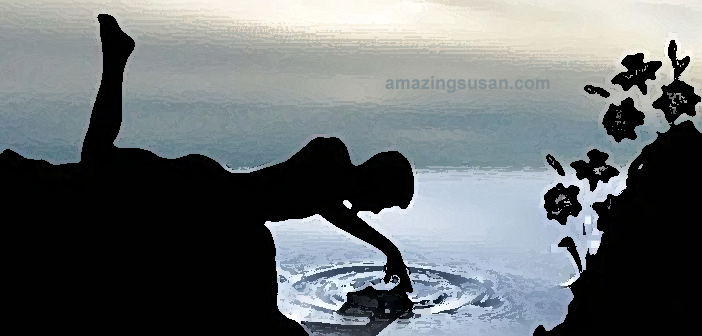the ripple effect
Today, once again, I find myself fascinated by the way things ripple and echo in and through my life.
I am writing a memoir of my experiences of narcissism. In brief, the Roman version of the myth of Narcissus, from which the term narcissism and in turn the label narcissist are derived, goes like this:
When the beautiful youth Narcissus was sixteen he was walking in the woods and Nymph Echo saw him and felt madly in love with him. She started following him and Narcissus asked “who’s there”, feeling someone after him.
Echo responded “who’s there” and that went on for some time until Echo decided to show herself. She tried to embrace the boy who stepped away from Echo, telling her to leave him alone. Echo was left heartbroken and spent the rest of her life in glens; until nothing but an echo sound remained of her.
Nemesis, though, the Goddess of Revenge, heard the story and decided to punish Narcissus. One day, while wandering in the woods, Narcissus sees himself in a pool of water and is amazed and captivated by the beauty of the reflection.
In the version I read the other day, Narcissus reaches out to touch the beautiful reflection in the water but of course when he does, it dissolves into ripples. Thus, in order to maintain the integrity of the image, he must not touch it lest it disappear. Perhaps worse, because he can’t tear himself away from the beauty of the reflection, he eventually dies of hunger and thirst while gazing at it.
Coincidentally (or perhaps not), on today’s date, April 8, in 2019, I shared a poem I had written to illustrate to a narcissist lover how it is normal for thoughts and words to spill out in a jumble — or at least it is for me. Coincidentally (or perhaps not), the poem, which I had written quite some time before but had not posted, was a reflection on dipping into a reflection from the bank of a pond.
When I reread it today, two years to the day after I first posted it, I was struck by the contrast between Narcissus and the woman in the poem. Specifically, between her ability to reach into the depths of herself (messy and muddy though those depths might be), to find learning and wisdom, and his inability to touch even the surface of his reflection for fear of destroying that which he loves, as superficial as it is. Therein, in my opinion, lies the saddest and most devastating aspect of this powerful myth.
Here are a few stanzas from the poem “reflection,” which may be read and heard in its entirety here:
…her face gazed back
from silken water
she wondered then
if she might falter
she broke the surface
with her hand
reached for the muddy
distant land
and plumbed within
the depths to find
what might be living
in her mind…
© 2021 Susan Macaulay . I invite you to share my poetry and posts widely, but please do not reprint, reblog or copy and paste them in their entirety without my permission. Thank you.
